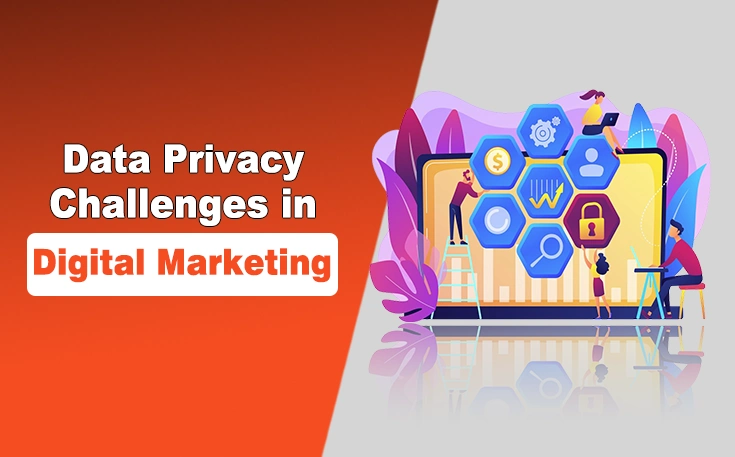Nowadays, businesses use digital marketing channels to reach target audiences. This approach exposes companies to several cybersecurity threats. Increasing numbers of cybercrimes have caused major setbacks to numerous online businesses.
Eventually, digital marketing agencies are also found to be causing a breach of important marketing data. This is where understanding and overcoming data privacy challenges in digital marketing comes in handy. If you are a digital marketing agency and facing data privacy issues for your clients, this blog post is for you.
This article will provide comprehensive insights and strategies for overcoming data privacy challenges in digital marketing.
Data Privacy in the Digital Marketing World
Data privacy is the right of customers to delegate how an organization and third-party companies utilize their data. Financial details, personal data, and demographics are just some information that may be disclosed. While these details support marketers in creating more personalized experiences, customers are concerned that their privacy is violated.
What are the Data Privacy Challenges?
Here is a brief details about what is data privacy challenges:
1. Lack of Transparency
Transparency is paramount in building trust with consumers. However, digital marketing practices often need more data collection and usage transparency. This lack of clarity can create scepticism among users and hinder the growth of customer relationships. Marketers must prioritize transparency by clearly communicating their data collection practices and obtaining user consent.
2. Compliance with Data Protection Regulations
The most challenging in digital marketing is confirming compliance with data protection regulations. Laws like the General Data Protection Regulation (GDPR) and the California Consumer Privacy Act (CCPA) have set strict guidelines for handling personal data. Marketers must attach to these regulations to avoid legal consequences and maintain trust with their audiences.
3. Balancing Personalization and Privacy
Personalization is a powerful tool for marketers to deliver relevant content to their target audience. However, achieving a balance between personalization and privacy is essential.
Overstepping boundaries and collecting excessive user data can lead to privacy concerns, causing users to become wary of sharing their information. Finding the right balance is crucial for maintaining trust and engagement.
4. Data Breaches and Security Risks
Data breaches can expose businesses to a dangerous threat. Cyberattacks and security breaches can gain access to sensitive information of a business, leading to financial losses, reputational damage, and legal liabilities. Digital marketers must implement strong security measures to protect user data and mitigate the risks associated with data breaches.

8 Best Practices for Overcoming Data Privacy Challenges
Below we present several essential steps to safeguard your data and systems against the cybersecurity challenges in digital marketing.
1 – Back-Up Data Regularly
Creating back-ups for all your data is important, particularly for essential files that, if lost, could result in revenue loss.
Regular back-ups can be useful in various challenging scenarios, including hardware crashes, malware hijackings, and ransomware attacks. You can safeguard your information even when crashing by storing sensitive marketing data in various mediums.
2 – Use Encryption Certificate
Utilize specific key encryption, which involves the utilization of both public and private keys. The certification dictates the authenticity and size of the encryption keys.
When implementing it for HTTPS, the encryption means changes. Symmetric encryption is employed for the private encryption process, while the certificate is responsible for verifying the signature when utilized.
3 – Protect the Critical Assets
Protecting critical data is essential to prevent it from falling into the wrong hands. Cybersecurity monitoring focuses on protecting this valuable information and preventing any breaches.
It is essential to remember that digital marketing agencies handle sensitive marketing data, including personally identifiable information (PII) and payment data. To uphold the security of this data, confirm compliance with data privacy laws and adhere to the Payment Card Industry Data Security Standards (PCI DSS).
4 – Multi-Factor Authentication
To protect against cybercriminals who employ brute force techniques, implement multi-factor authentication (MFA) or two-step verification, which involves using a one-time password from a shared secret key. Relying only on basic cybersecurity tools leaves vulnerabilities that cybercriminals can use.
Develop a comprehensive security strategy containing continuous monitoring, proactive tool and system upgrades, and ongoing training for employees and business partners. This holistic approach confirms stronger protection against potential breaches.
5 – Use a VPN
A VPN enables you to establish an encrypted tunnel, confirming your data is securely transmitted to a remote server. Your identity remains concealed, making it difficult for anyone to trace the origin of your messages by obtaining a temporary IP address provided by the network.
As a protective shield and anonymous intermediary, a VPN protects your online activities from prying eyes. VPNs can block malware-infected websites, intrusive ads, and other tracking attempts to compromise your system’s security.
6 – Educate the Employees
The whole system is at risk when a single employee’s negligence allows cybercriminals to gain access and wreak havoc.
To prevent such security breaches, educating employees of the digital marketing agency on cybersecurity is crucial. That requires the organization to invest time and resources in training its employees. A weak link could compromise the entire chain of security.
7 – Use Strong Password
Using strong passwords is an excellent barrier and makes it challenging for malicious actors to breach and obtain unauthorized access.
It is necessary to use unique passwords for each account, regularly update them, and forgo using the same password for unfamiliar websites. You can significantly reduce the risk of vital marketing information falling into the wrong hands by practising such diligence.
8 – Update Operational Security Measures
Thoroughly examine the information or data to confirm its integrity and prevent compromises. Therefore, the cybersecurity team must focus on implementing operational security measures.
The significance of these measures depends on clearly defining responsibilities and authorizations within the organization. Potential lapses can be avoided, and the level of exposure can be minimized by maintaining clarity in these areas.
To Wrap Up
In this modern world of digital marketing, prioritizing data privacy is a legal requirement and a competitive advantage.
Businesses can establish trust, maintain compliance, and build strong customer relationships by understanding the challenges associated with data privacy and implementing privacy-first practices. Remember, overcoming the data privacy challenge is an ongoing process that requires continuous adaptation to evolving regulations and emerging technologies.





